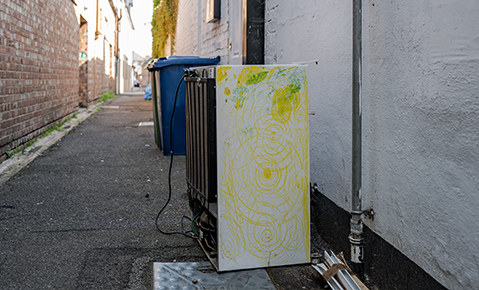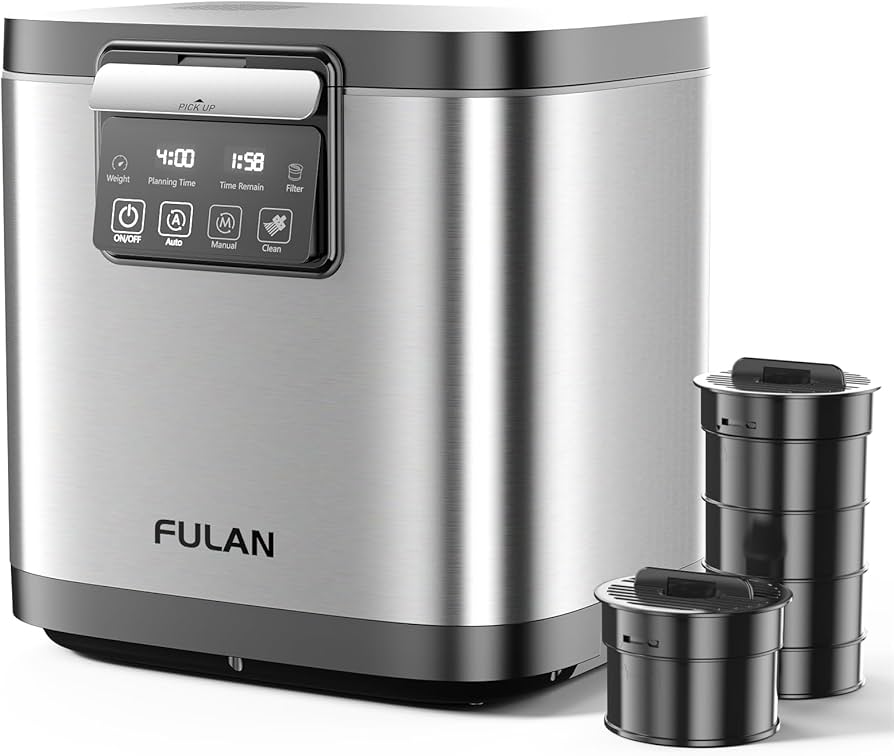To dispose of a small refrigerator, contact your local waste management service for pick-up options. You can also consider recycling it at designated facilities.
Disposing of a small refrigerator can seem daunting, but it’s essential for both safety and environmental reasons. Improper disposal can lead to harmful chemicals leaking into the environment. Many municipalities have specific guidelines for appliance disposal. Recycling programs can often handle these appliances safely and responsibly.
Before you begin, check if your old refrigerator has any remaining food or hazardous materials inside. Properly preparing your appliance for disposal ensures a smoother process. Understanding your local regulations can help you navigate this task efficiently. Make the right choice for your old fridge, and contribute to a cleaner planet.

Credit: www.dumpsters.com
Introduction To Eco-friendly Disposal
Disposing of a small refrigerator requires careful thought. Eco-friendly disposal helps protect our environment. Many people overlook the effects of improper disposal. Understanding the best practices is essential for everyone.
Importance Of Responsible Disposal
Responsible disposal of appliances offers numerous benefits:
- Reduces landfill waste
- Conserves energy and resources
- Prevents pollution
- Protects wildlife habitats
Many components of a refrigerator are recyclable. By recycling, you contribute to a circular economy. This process reuses materials, reducing the need for new resources.
Environmental Impact Of Refrigerants
Refrigerants are chemicals that cool the air inside your fridge. They can harm the environment if not handled correctly. Some refrigerants are potent greenhouse gases.
Improper disposal can lead to:
- Ozone layer depletion
- Global warming
Always check the type of refrigerant in your fridge. You can find this information on the appliance’s label. Here’s a simple table summarizing common refrigerants:
| Refrigerant Type | Impact on Environment |
|---|---|
| R-22 | Ozone-depleting |
| R-134a | Greenhouse gas |
| R-410A | Less harmful, but still potent |
Proper disposal methods include using licensed professionals. They know how to handle refrigerants safely. Always choose eco-friendly options to protect our planet.

Credit: www.jiffyjunk.com
Local Waste Regulations
Disposing of a small refrigerator requires knowledge of local waste regulations. Each area has specific rules. Following these rules ensures safe and responsible disposal. It also helps protect the environment.
Understanding Your Area’s Disposal Rules
Local regulations vary greatly. Check your city or county website for specific guidelines. Here are common disposal methods:
- Regular garbage collection
- Hazardous waste facilities
- Recycling centers
- Special collection events
Some areas may require special permits. Always verify with local waste management. They provide the most accurate information.
Penalties For Improper Disposal
Improper disposal can lead to serious consequences. Penalties vary based on location. Common penalties include:
- Fines
- Community service
- Legal action
Improper disposal harms the environment. It can lead to hazardous materials leaking. Always follow local rules to avoid penalties. Protect your community and environment.
Preparing Your Refrigerator For Disposal
Properly preparing your small refrigerator for disposal is crucial. This process ensures safety and compliance with local regulations. Follow these steps to make the disposal smooth and hassle-free.
Cleaning And Defrosting
Cleaning and defrosting your refrigerator is essential. This step prevents odors and bacteria from spreading. Here’s how to do it:
- Unplug the refrigerator. Always start by unplugging it.
- Empty the contents. Remove all food and drinks.
- Defrost the freezer. Leave the door open to let ice melt.
- Clean the interior. Use a mixture of water and vinegar.
- Wipe surfaces. Use a sponge or cloth to clean all areas.
- Dry completely. Ensure no moisture remains inside.
These steps help maintain cleanliness and prevent any unpleasant smells.
Securing The Doors
Securing the doors is vital for safety during transport. Follow these tips:
- Use tape or straps. Secure the doors shut.
- Remove any loose parts. Take off shelves or trays.
- Label the refrigerator. Indicate that it’s not in use.
These precautions avoid accidents and ensure safe handling.

Credit: www.dumpsters.com
Refrigerant Removal
Removing refrigerants is a vital step in disposing of a small refrigerator. These gases can harm the environment and human health. Proper handling ensures safety and compliance with regulations.
Why It’s Crucial
Refrigerants contain chemicals that can:
- Deplete the ozone layer
- Contribute to climate change
- Harm aquatic life
Improper disposal can lead to legal penalties. Always follow regulations for refrigerant disposal. Safety should be your top priority.
How To Safely Remove Refrigerants
Follow these steps for safe refrigerant removal:
- Wear protective gear: gloves, goggles, and a mask.
- Locate the service valve on the refrigerator.
- Connect a refrigerant recovery machine to the valve.
- Turn on the machine to extract the refrigerant.
- Ensure all refrigerants are collected properly.
- Seal the service valve after extraction.
Consider hiring a professional if unsure about the process. Professionals have the right tools and knowledge.
| Step | Description |
|---|---|
| 1 | Wear protective gear |
| 2 | Locate the service valve |
| 3 | Connect recovery machine |
| 4 | Turn on the machine |
| 5 | Seal the valve |
After refrigerant removal, contact your local waste management. They can guide you on proper disposal methods.
Recycling Options
Recycling your small refrigerator is a smart choice. It helps reduce waste. Many parts of the fridge can be reused or recycled. This process is good for the environment.
Finding A Recycling Facility
Locate a facility that recycles appliances. Use online resources to find options nearby. Here are steps to help you:
- Search online for “appliance recycling near me”.
- Check local government websites for recycling programs.
- Call local waste management for recommendations.
- Ask friends or family for suggestions.
Some stores offer recycling for old appliances. They may pick up your fridge when they deliver a new one.
Benefits Of Recycling Appliances
Recycling small refrigerators has many benefits:
- Environmental Protection: Reduces landfill waste.
- Resource Conservation: Saves energy and materials.
- Pollution Reduction: Lowers harmful emissions.
- Community Support: Creates local jobs in recycling.
Recycling can also save you money. Many recycling centers offer cash for your old fridge. Check for programs in your area.
Donation And Reuse
Donating or reusing a small refrigerator helps the environment and community. It reduces waste and provides useful appliances to those in need. Here’s how to donate your refrigerator effectively.
Where To Donate Your Refrigerator
Several organizations accept small refrigerators. Check local charities or non-profits. Here are some options:
| Organization | Contact Method | Notes |
|---|---|---|
| Habitat for Humanity | Call or visit their website | Accepts working appliances |
| Goodwill | Visit local store or website | Check for pickup services |
| Salvation Army | Schedule a pickup online | Working appliances only |
Preparing For Donation
Before donating, prepare your refrigerator properly. Follow these steps:
- Unplug the refrigerator at least 24 hours before pickup.
- Clean the interior with soap and water.
- Remove all food and items from shelves.
- Check for any damages or issues.
- Provide manuals or paperwork if available.
Make sure the appliance is in good working condition. This ensures it will be useful for the next owner. Your donation can make a real difference.
Haul-away Services
Haul-away services make disposing of a small refrigerator easy. These services handle the heavy lifting. You save time and effort. Explore your options to find the best fit.
Retailer Take-back Programs
Many retailers offer take-back programs for old appliances. This is a simple way to dispose of your small refrigerator. Check with your retailer before purchase.
- Benefits of Retailer Take-Back:
- Convenience: They pick up the appliance at delivery.
- Eco-Friendly: Many recycle old appliances properly.
- Cost-Effective: Some programs are free or low-cost.
Contact your retailer for details on their program. Ask about:
- Pickup fees.
- Recycling practices.
- Scheduling options.
Hiring Professional Removal Services
Professional removal services specialize in appliance disposal. They handle the entire process for you. This option ensures safe and efficient removal.
| Service Type | Pros | Cons |
|---|---|---|
| Local Junk Removal | Quick pickup, flexible scheduling | May be expensive |
| Specialized Appliance Removal | Trained professionals, eco-friendly | Limited availability |
Before hiring, ask for:
- Quotes and pricing.
- Reviews from past customers.
- Insurance coverage.
Choose a service that fits your needs. Ensure they follow local regulations for disposal.
Diy Disposal Tips
Disposing of a small refrigerator can be easy. Follow these tips to do it yourself. Proper disposal helps the environment. Here are ways to break it down and transport it safely.
Breaking Down The Refrigerator
To dispose of a small refrigerator, first break it down. This makes transportation easier. Follow these steps:
- Unplug the refrigerator.
- Remove all food and shelves.
- Take off the doors to prevent accidents.
- Drain any fluids, like water or coolant.
Use the following tools:
- Screwdriver
- Wrench
- Bucket for fluids
Check local laws about refrigerant disposal. Some refrigerants can harm the environment.
Safe Handling And Transportation
Transporting your broken refrigerator safely is crucial. Follow these tips to avoid accidents:
- Use gloves to protect your hands.
- Get help lifting heavy parts.
- Wrap sharp edges with tape or cloth.
For transportation:
| Item | Action |
|---|---|
| Refrigerator | Secure it in the vehicle. |
| Doors | Store them separately. |
| Fluids | Dispose of them at a hazardous waste facility. |
Use a truck or trailer for transport. Ensure the refrigerator is stable during the trip. Avoid sudden stops or sharp turns.
Innovative Upcycling Ideas
Upcycling old refrigerators is a smart way to reuse materials. It helps reduce waste and saves money. Many creative projects can turn a discarded fridge into something useful or decorative. Here are some exciting ideas to inspire your next DIY adventure.
Creative Projects With Old Refrigerators
Transforming your old refrigerator into a new item can be fun. Here are some ideas to consider:
- Outdoor Storage: Use the refrigerator as a garden shed for tools.
- Planter Box: Cut it open and fill it with soil for plants.
- Barbecue Grill: Modify the fridge to create a unique grill.
- Art Piece: Paint and decorate the outside for a funky look.
- Cooler: Keep it sealed and use it as a portable cooler.
Each project requires some tools. Be sure to wear safety gear. Enjoy crafting something new from your old fridge!
Sharing Upcycled Creations Online
Once your project is complete, share it online. Many platforms celebrate upcycled creations.
- Instagram: Post photos and use hashtags like #UpcycledArt.
- Pinterest: Create boards to showcase your ideas.
- Facebook Groups: Join communities focused on DIY projects.
- YouTube: Upload videos to show your process and results.
Sharing inspires others. It promotes creativity and sustainability. Engage with others who love upcycling!
Conclusion: The Importance Of Conscious Disposal
Disposing of a small refrigerator requires care and responsibility. Proper disposal protects the environment. It also ensures safety for everyone involved. Understanding eco-friendly disposal methods is crucial. This helps reduce waste and prevent harmful effects.
Summary Of Eco-smart Tips
- Check Local Regulations: Know your area’s disposal rules.
- Recycle Components: Recycle metals and plastics when possible.
- Use Certified Services: Choose certified e-waste disposal companies.
- Remove Hazardous Materials: Safely dispose of refrigerants and oils.
- Donate or Sell: Consider donating or selling if functional.
Encouraging Sustainable Practices
Embracing sustainable practices can make a difference. Simple actions lead to big impacts. Here are some ways to encourage eco-friendly habits:
- Educate Others: Share tips with friends and family.
- Participate in Community Clean-Ups: Join local efforts to clean up waste.
- Support Green Businesses: Choose companies that prioritize sustainability.
- Advocate for Recycling Programs: Promote local recycling initiatives.
Every action counts. Conscious disposal of appliances helps create a cleaner planet. Let’s commit to being responsible consumers.
Frequently Asked Questions
How Do I Recycle A Small Refrigerator?
To recycle a small refrigerator, first check local guidelines. Many areas have specific recycling programs for appliances. You can also contact local waste management services. They often provide pickup options or drop-off locations. Ensure all contents are removed before recycling.
Can I Dispose Of A Refrigerator In Regular Trash?
No, you should not dispose of a refrigerator in regular trash. Refrigerators contain harmful substances, such as refrigerants. These can be dangerous to the environment. Instead, follow local disposal regulations or use specialized recycling services.
What Should I Do Before Disposing Of My Refrigerator?
Before disposing of your refrigerator, unplug it and empty all contents. Clean it thoroughly to prevent odors. Check for local disposal guidelines. You may need to remove doors to prevent safety hazards. Proper preparation ensures a smooth disposal process.
Where Can I Donate An Old Refrigerator?
You can donate an old refrigerator to local charities or organizations. Many shelters and community centers accept working appliances. Check with local nonprofits for their specific needs. Some may even offer pickup services, making it easier for you to donate.
Conclusion
Disposing of a small refrigerator can be straightforward. Always check local regulations for proper disposal methods. Recycling is an eco-friendly option that benefits the environment. Consider donating if the unit is still functional. Taking these steps ensures responsible disposal, helping you clear space while protecting our planet.
Make your choice count!

